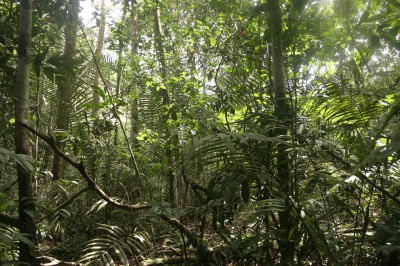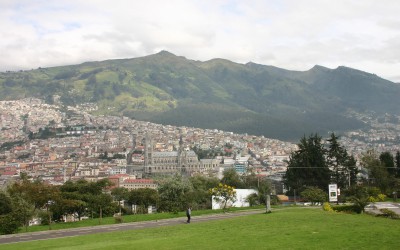


 From sweating in the steamy jungle to tramping in the
From sweating in the steamy jungle to tramping in the
cool cloud forest, from sauntering in a colourful market to swimming with
penguins in the vast Pacific Ocean, and from quick glimpses of elusive
hummingbirds to close encounters with docile sea lions – so many adventures in
a country slightly smaller than Italy (or Colorado). This is Ecuador! From the
fresh, thin air in the lofty Andes Mountains to the bracing, salty, sea level
air of the Galapagos Islands, every breath I take seems to bring new
adventures.
Where to begin my tale? The main reason for my
choosing to visit Ecuador is to enjoy the nature and wildlife, but let’s start with
a bit of cultural and political background. First stop on the agenda is the
city of Quito, the capital of Ecuador (population 2 million). Nestled in the
Andes Mountains at 2850 m above sea level it is the second highest capital city
in the world (after La Paz). It lies in a valley with a deep gorge and sprawls
about 35 km in its length. The mountains limit its expansion in the other
directions so although houses do cling to the mountainsides, the city is only 5
km wide.  The old part of town is particularly charming with its
The old part of town is particularly charming with its
parks, plazas, monuments, and ornately decorated Spanish Colonial churches and
buildings – it is in fact a UNESCO World Heritage Site.



 The Spaniards were, of course, not the first people
The Spaniards were, of course, not the first people
here. The peaceful Quitu people dominated the area until the expansionist Incas
came along in the mid-1400s and eventually conquered Quito around 1500. The
Inca introduced a sun god, roads, taxes, collective land ownership and new
crops such as cacao, sweet potatoes and peanuts.  After the Incas came the Spanish with their horses,
After the Incas came the Spanish with their horses,
weapons and germs. Exit Inca civilization; enter Spanish rule, Christianity,
devastating diseases and economic mismanagement. Ecuador finally broke free and
became independent from Spain in 1822. It became part of something called Gran
Colombia that also included Venezuela and Colombia. This amalgamation did not
work out and Ecuador became a fully independent nation in 1830.
First cacao, then
bananas and now oil are major sources of income. Politically and economically,
there have been good times and hard times. A notable leader was the leftist Rafael
Correa from 2006 until 2017 who invested heavily in health care, education,
roads and pensions. However, much of the money for these much-needed and very
welcome reforms came from taxing oil profits. Although Ecuador in many ways
seems to be ecologically aware, recent permits to drill for oil in the Yasuni
National Park do not really harmonise with an environmentally-friendly outlook. Apparently, even
socialists prioritise capital over nature.

